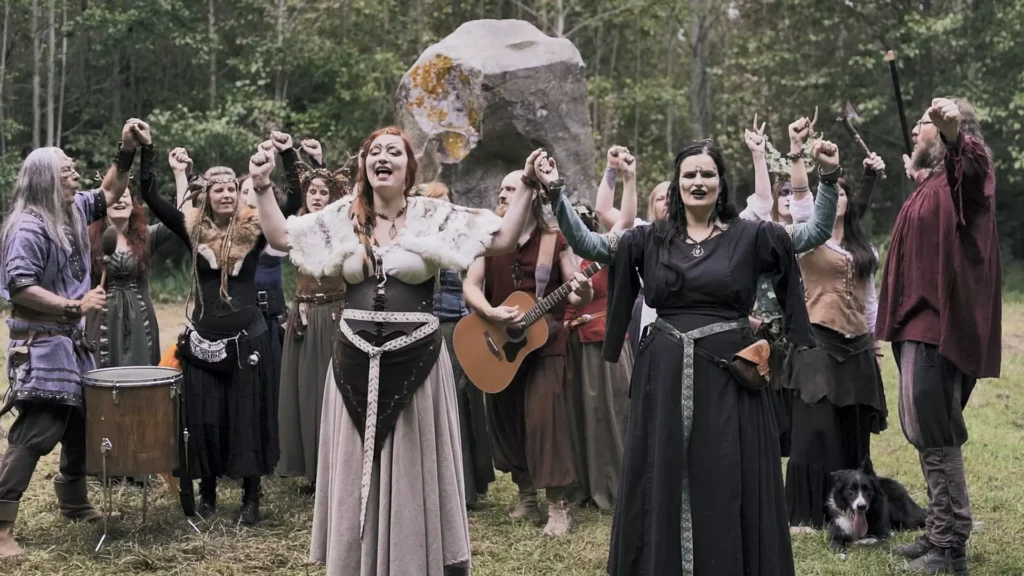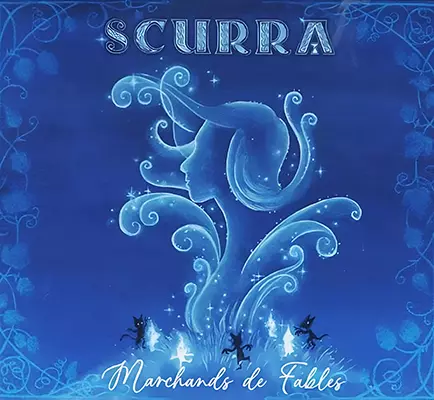Scurra, the French Medieval Folk band known for its “strolls” around medieval fairs, released their album Marchands de Fables in April 2024. The band graciously sent us its digital version for reviewing.
Comprised of members from different musical backgrounds, the band offers narrative-oriented songs sung in their native French. Their music is perfectly crafted for open-air medieval fairs, where they get very close to the audience, strolling among their fans, though some tunes seem more suited for taverns. In both cases, the theatrical nature of their performances reveals their passion for live action role-playing games.
Scurra – Marchands de Fables
Before getting to the music, I’d like to compliment the beautiful booklet, with fairytale-inspired illustrations painted by Charline, perfectly suited for the music contained in the album.
Marchands de Fables starts with Sorcières, promptly exhibiting the powerful singing of Aubélia l’Écumeuse and the signature polyphony sustained by the band’s capable singers/instrumentalists. With lyrics paying tribute to the legacy of all the women defamed and condemned as devil-worshipping witches in the past, the song serves as a call for unity, empowered by an alluring melody that will not leave your mind so easily.
The following track, Il Nous Reste à Chanter is probably the one that best translates the spirit of the “strolling” in the album. The song sounds just like a joyous march to celebrate life until one can no longer keep up with it. Here, Fergus’s flute and Ombeline’s violin stand in the spotlight, while the percussion and the bouzouki dictate the rhythm of the march, with Irish traditional Morrison’s Jig as a closing act.

The almost-title-track Marchand de Fables (yes, singular), tells a humorous story about a freeloading tavern “patron”. This one is clearly one of the most-suited tracks for closed spaces, providing the best example of how Scurra is good at creating and telling stories via their songs, with intelligent good-humour, finding great company in Balian’s guitar (or the bouzouki).
Je Vivrais Allègrement will probably ring bells in your mind, since its opening melody was written by Guillaume de Machaut in the 14th century. The same melody went viral around the Internet in 2017 with Apocalypse Orchestra’s medieval metal version of the tune. The track is actually a well-suited interpretation of two compositions by Marchaut, Je Vivroie Liement and Douce Dame Jolie.
L’Echo des Forges shall surely appeal to all blacksmiths, real ones and role-played alike. This is the song with the fastest and heaviest sonority in the album, a really spirit-lifting one.
L’Ombre des Bois and La Peste Dansante are the darkest songs in the album. The former is more melancholic in its atmosphere, while the latter is more ominous, specially with the flute serving as a warning of the effects of the 1518 plague in Strasbourg.

After many different emotions evocated by the album, it closes with L’Acabriole, a proper song for a medieval fair, joyous and danceable in melody, humorous in its lyrics.
The strongest point of Machands de Fables is clearly the variation of the songs. Here we have tunes for every mood, all permeated by the spirit of the Middle Ages in Europe, with a modern twist.
Lineup
- Aubélia l’Écumeuse (main vocals)
- Ombeline la Fougueuse (alto, violin, vocals)
- Fergus Mac Aron (flute, vocals)
- Balian Boit-sans-Soif (guitar, bouzouki, vocals)
- Svik Den LognerSonn (percussion, vocals)
- Axel Wursthorn (bass #5)

Tracklist
1. Sorcières
2. Il Nous Reste à Chanter
3. Marchand de Fables
4. Je vivrais Allègrement
5. Tellurique
6. L’écho des Forges
7. Ombres des Bois
8. La Peste Dansante
9. Vivant Feu Follet
10. L’Acabriole
Below, you can watch the music video for the first track in the album, Sorcières.
